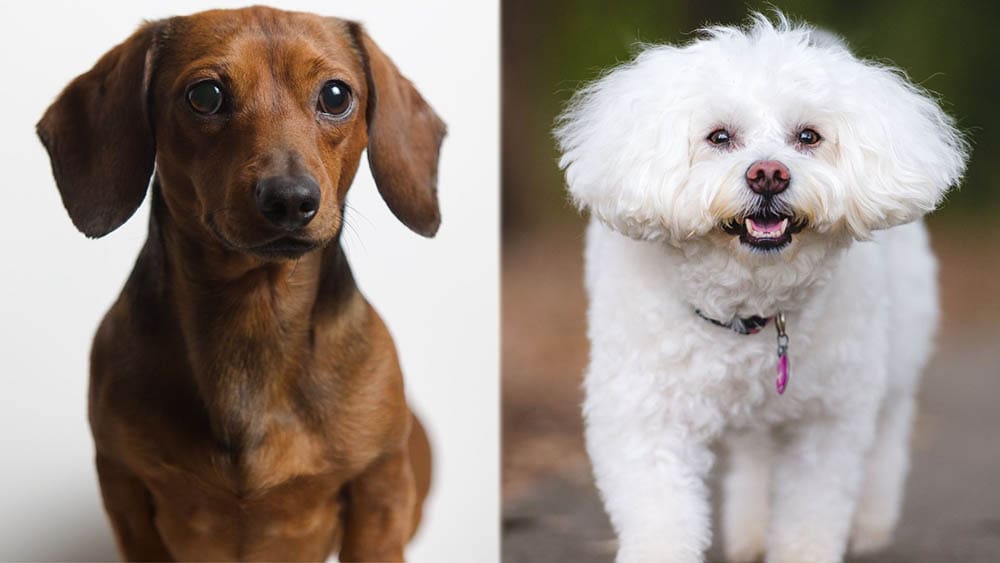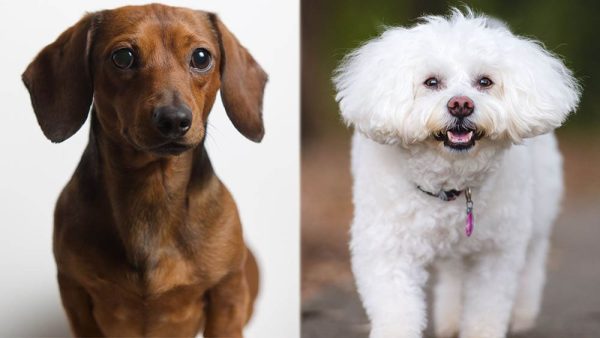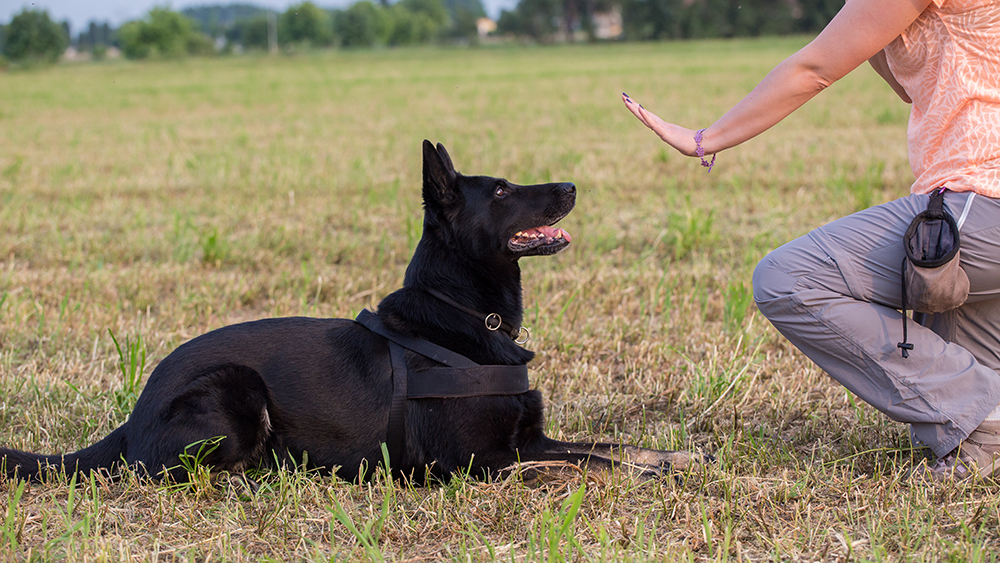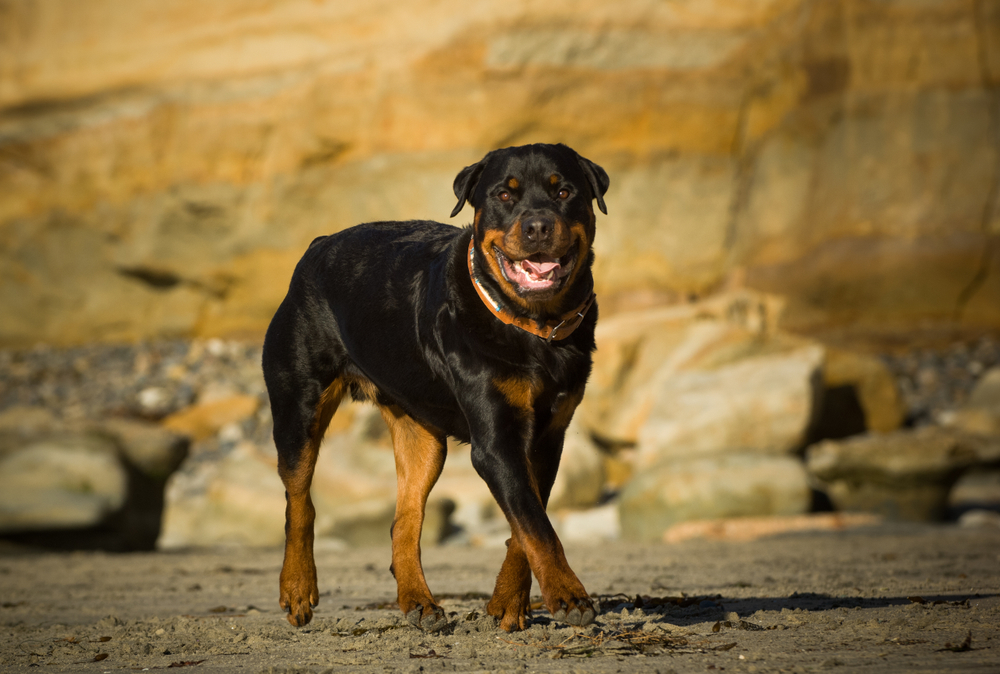Click Below to Skip Ahead
The Doxie-Chon is a cross between the Bichon Frise and Dachshund breeds. As a mixed breed, it’s difficult to say whether your dog will more closely match the appearance of characteristics of the long-bodied Dachshund or the Poodle-like Bichon Frise, but the resulting mix will usually fall somewhere between the two breeds.
Breed Overview
Height:
9–11 inches
Weight:
10–25 pounds
Lifespan:
12–15 years
Colors:
Black, brown, tan, rust, white
Suitable for:
Owners looking for a loving dog and that have some experience with stubborn dogs
Temperament:
Loving, loyal, playful, lively, stubborn
The Doxie-Chon may be hypoallergenic, and it usually has the long back of the Dachshund, although this isn’t always the case. Generally, you can expect a clever dog that is lively and loving, but it can also be a little stubborn and highly playful.
Doxie-Chon Characteristics
Doxie-Chon Puppies
The Doxie-Chon is not yet a popular designer breed, which means that the cross is most commonly born as a result of accidental or unintentional mating. This also means that the cost of Doxie-Chon puppies should be lower than either of the parent breeds with costs ranging from $500 to $1,000. If you are looking specifically for a Doxie-Chon, research potential breeders including local breeders, but be prepared for the fact that you may need to travel to find a breeder.
Always visit the breeders to check out the conditions the puppy was bred in and to meet the puppies before confirming you want one. Ideally, the puppy should be aware that you’re visiting but not be overly eager. It will usually look to its mother to determine how to act around strangers, so try to meet the mother. The two breeds can mate naturally, so the father may also be available to meet. Although the puppy may change appearance a little as it ages, even at a young age you will be able to see the type of coat and even the likely colors of the dog.
Because the Doxie-Chon is not purebred, it can be found in shelters and rescues as well as breeders. It may be more difficult to find puppies when looking in shelters, as most dogs that are surrendered are adult dogs that need a loving home. Try to get as much background on the dog as possible, be sure to spend some time with it, and if you have children or other dogs, have them meet the dog before you decide to adopt.
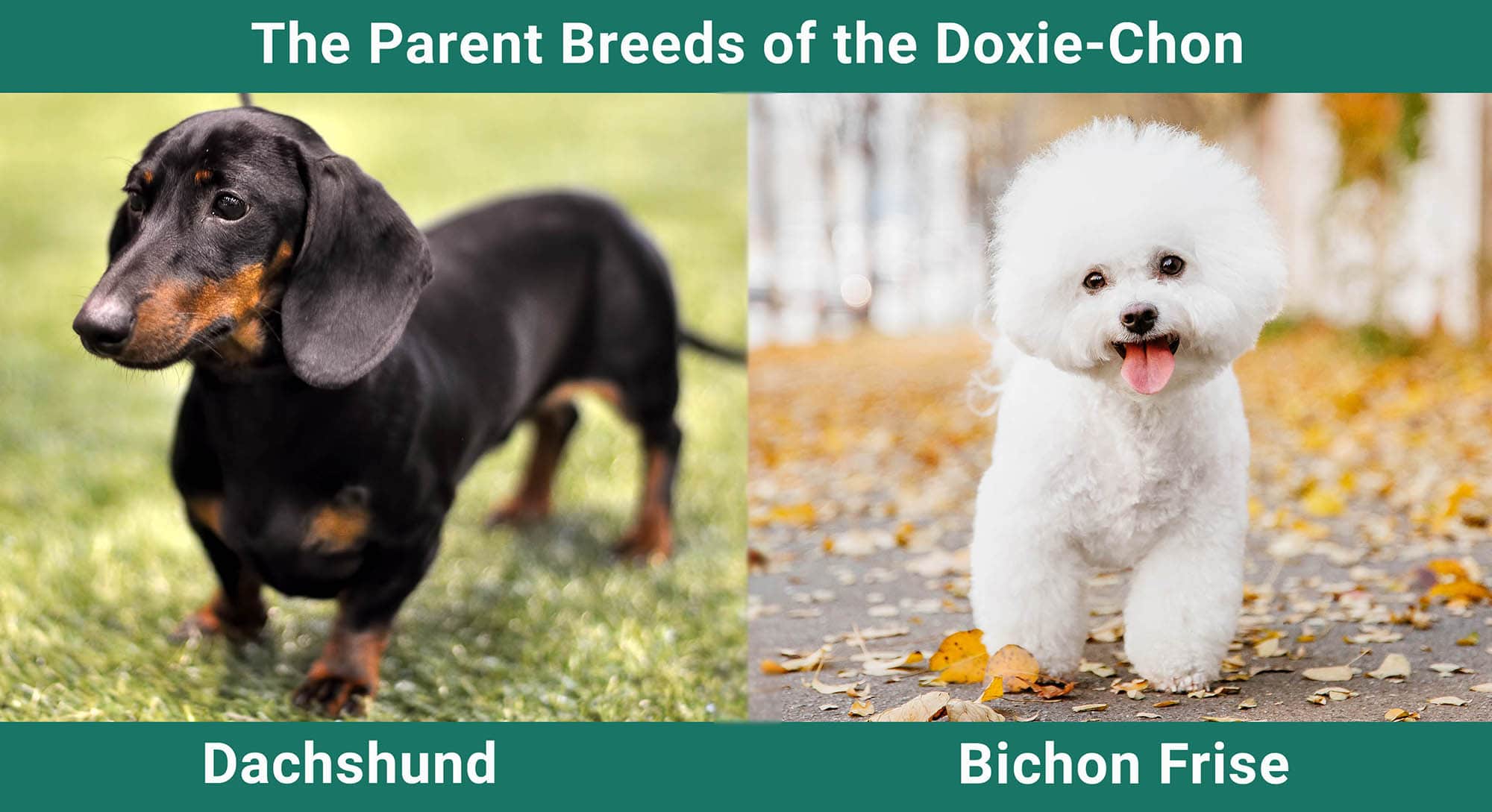
Temperament & Intelligence of the Doxie-Chon
Most crosses tend to combine some of the features of both parent breeds. It can be difficult to predict exactly what a mixed breed’s temperament will be like, but we can look at the parent breeds to get some idea of what to expect. In this case, we have the lively and loving Bichon Frise combined with the loving and diligent Dachshund.
Are These Dogs Good for Families?🏡
The Dachshund is a popular family pet that gets along with all family members, regardless of age. Its back and its relatively small size, as well as its propensity to burrow and hide under cushions and in blankets, means that you do need to take care around the Dachshund. The Dachshund can be wary of strangers, however, and the breed does need a lot of early socialization to help get over this.
The Bichon Frise, on the other hand, will get along with everybody including family and, usually, strangers. So, the Doxie-Chon should make a very good family pet that will get along with kids as well as adults, but whether it gets on with strangers will depend on whether it’s more of a Bichon or a Dachshund, and how well the dog is socialized when it is younger.
Does This Breed Get Along with Other Pets?🐶 😽
Although the two parent breeds differ in their acceptance of strangers, they are both considered reasonably good with dogs and don’t tend to chase cats. It’s always easier to introduce dogs and cats when they are all young, but it is also possible to make introductions, gradually and patiently, when they are older.
Even if you are adopting an older dog or you have existing pets that are older, you should still be able to bring a Doxie-Chon home without too many problems.
Things to Know When Owning a Doxie-Chon:
The Doxie-Chon can make a great family pet, although it can be prone to separation anxiety if it takes after the demanding Bichon Frise parent breed. Depending on whether it is more Bichon or Dachshund, in temperament, it may or may not get along with strangers, but it should be good with other pets as long as you introduce them carefully.
It can make a good choice of dog for the right owner, but it isn’t the ideal choice for everybody. Below are some of the things to consider when contemplating a Doxie-Chon as a pet.
Food & Diet Requirements🦴
The Doxie Chon is a small breed, and it has a similarly small appetite. Expect to feed approximately a cup of dry food per day. Alternatively, if you are feeding canned or wet food, weigh your dog to get an accurate size and base the amount you feed on the manufacturers’ guidelines. If your vet has recommended more or less, always follow these guidelines above all else.
If you use treats for training or provide treats and other sources of food over the day, you need to adjust the feeding amounts accordingly. This is especially important with small dogs because even a seemingly small treat could contain a lot of your dog’s recommended caloric intake for the day. Always make sure your dog has access to fresh, clean drinking water. Access to water shouldn’t be restricted and you will need to make sure the bowl always has water.
Exercise🐕
Although the Bichon Frise is a lively little dog that loves to play, it is still a small breed, and when combined with the long-backed Dachshund, this means that exercise requirements are not too demanding. You should provide at least 30 minutes of walks a day, up to an hour, and you can supplement this with some time playing with a ball or other toy.
The Doxie-Chon can adapt to life in an apartment because it is small and doesn’t require too much exercise, but daily walks are even more important in these instances.
Training🦮
The Doxie-Chon usually has the long back of the Dachshund, which means that it can struggle with certain types of canine sports and classes, but it can do very well at agility, and this can be a great way to help ensure the dog is well socialized and that it is mentally and physically tested.
Early socialization for this breed is important, especially to help with the Dachshund’s tendency to be wary of strangers. Socialization means introducing a new dog to new people and different situations that they have not experienced before. It not only gets them used to these situations, but it teaches them that new people and new experiences are nothing to be scared of or anxious about.
The mix can be quite stubborn to train, although it is intelligent enough to learn most commands. Be persistent and consistent, firm but fair, and try to keep training sessions short and fun to keep your Chon’s attention.
Grooming ✂️
While the Dachshund has a short, sleek coat, in most cases, the Bichon Frise has a curly coat that looks similar to that of a Poodle. The cross will usually have a mixture of these two coat types so it will have loose curls. It will be more hypoallergenic than the Dachshund but not as hypoallergenic as the Bichon Frise.
Brush at least three times a week to help remove dead hairs and to keep the dog comfortable. You will also need to brush your dog’s teeth at least three times a week and cut their nails roughly every 2 months.
Health and Conditions❤️
One of the benefits of mixed-breed dogs is that they are less prone to hereditary or genetic conditions that purebred dogs suffer. However, there are still some conditions that the Doxie Chon may be prone to.
- Corneal Dystrophy
- Mitral Valve Dysplasia
- Atopy
- Diabetes
- Epilepsy
- Hip Dysplasia
- Von Willebrand’s Disease
Male vs Female
Generally, the individual character of a dog is more likely to determine its character than its gender. With that said males do tend to grow a little larger. And owners claim that males are more likely to show their emotion to their humans and are fun-loving, while females are prone to mood swings and can be territorial.
3 Little-Known Facts About the Doxie-Chon
1. Dachshunds Were Bred to Hunt Badgers
Dachshunds are renowned for their long bodies and comparatively short legs. As well as giving the breed its signature cute looks, the body is perfectly shaped and built for the breed’s original job of badger hunting. Short legs enable the Dachshund to stay low to the ground so they can track the scents of their prey. The short, long body makes it possible for the dog to get into badger sets.
As well as its physical characteristics, the Dachshund’s bravery and tenacity also aid it in the role of badger hunter.
The name Dachshund actually translates as “badger dog” and, following World War I when the Dachshund was used in German propaganda and Kaiser Willhelm II was known to be a fan of the breed, the American Kennel Club rebranded the dog from Dachshund to Badger Dog.
2. Dachshunds Can Live 20 Years or More
Small dog breeds tend to live longer than large dog breeds, and both the Bichon Frise and the Dachshund are small breeds. This means that you can expect the Doxie-Chon to have a lifespan of around 15 years or more. The Dachshund is especially long-lived, and Dachshunds have held the crown as the world’s oldest dog on two occasions.
23 dogs have held the title and, as well as Chanel and Scolly, the two Dachshunds to have held the title, a Dachshund cross named Otto was also crowned the world’s oldest dog.
3. Bichon Frises Are Considered Hypoallergenic Dogs
Bichon Frises are sometimes mistakenly referred to as white Poodles. Although this isn’t accurate, Bichon Frises and Poodles do share at least one characteristic. Both are considered hypoallergenic dogs. The curly coat of the Bichon doesn’t shed as much as the coat of other dogs, which means allergy sufferers are less likely to come into contact with dog hair, dander, and the protein that causes allergic reactions. The protein is still found in saliva, urine, and sweat, and it is still on the dog itself, so some allergic reaction is likely.
The Doxie-Chon is likely to have a slightly longer and wavier coat than the Bichon Frise and it will molt more than the purebred Bichon Frise, but it is likely to still be better for allergy sufferers than a pure Dachshund.
Final Thoughts
The Doxie-Chon combines two sweet, cute breeds, the Dachshund and the Bichon Frise. The resulting cross is a small dog that is lively and energetic. Although intelligent, it can be a little difficult to train because it can be stubborn. But the Doxie-Chon is likely to enjoy spending time with its family and may even suffer separation anxiety if it takes after the Bichon Frise. But it can be a smart dog that is somewhat independent thinking and doesn’t have too high a maintenance requirement.
The cross does usually inherit the long back of the Doxie, however, and this takes a little extra care.
Featured Image Credit: (L) Khalid Elkady, Unsplash | (R) Kellymmiller73, Shutterstock

